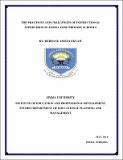| dc.description.abstract | This study was conducted to assess the Practices and Challenges of Instructional Supervision in Asossa Zone Primary Schools. To conduct the study, descriptive survey design was employed and Multistage sampling technique was employed to select the sample Woredas, cluster centers, school principals and teachers. To this end, 6 Woreda Education Officers, 13 cluster supervisors, 24 primary schools with 24 school principals and 157 teachers were included in this study. Questionnaire was the main data gathering instrument for this study. Thus, 157 teachers, 24 school principals, and 13 cluster supervisors filled the questionnaires. An interview was also conducted to enrich the quantitative data. As a result, six Woreda Education Officers were interviewed. Quantitative data collected through questionnaire was analyzed by using mean scores and „F‟ test by using SPSS v.16.o. The data gathered through interview was discussed in line with questionnaire. Consequently, the main findings come out from this study were: instructional supervisors attempt to identify strengths and limitations of teachers in the classroom in order to design appropriate intervention was insignificant; in addition, intervention of instructional supervisors so as to assist teachers improve their limitations was insufficient; teachers gained support from supervisors in order to improve their instructional skills was insufficient. Instructional supervisors‟ effort in liaising schools/clusters with various organizations, community groups and other interests in matters that affect quality education were also insufficient. The major challenges that primary school instructional supervisors come across while implementing instructional supervision was multiple. They were overburdened with other tasks, teaches the same credit like other teachers, teachers are challenged to accept recommendation and do not have financial allowances. Finally, to minimize and if possible to solve the problems, the following recommendations were drawn; the Woreda Education office, Asossa Zone Education Department and the region in collaboration with schools should give training for instructional supervisors; instructional supervisors in Asossa Zone should arrange induction training for beginner teachers; experience sharing programs and support teachers in doing action research. In addition to these; instructional supervisors should give professional support to teachers in order to improve their instructional limitations; they also had great responsibility to link the schools with other stakeholders and finally recommended that instructional supervisors were overburdened with other works and the school and woreda education offices should fulfill the required offices with furniture and stationeries. | en_GB |


